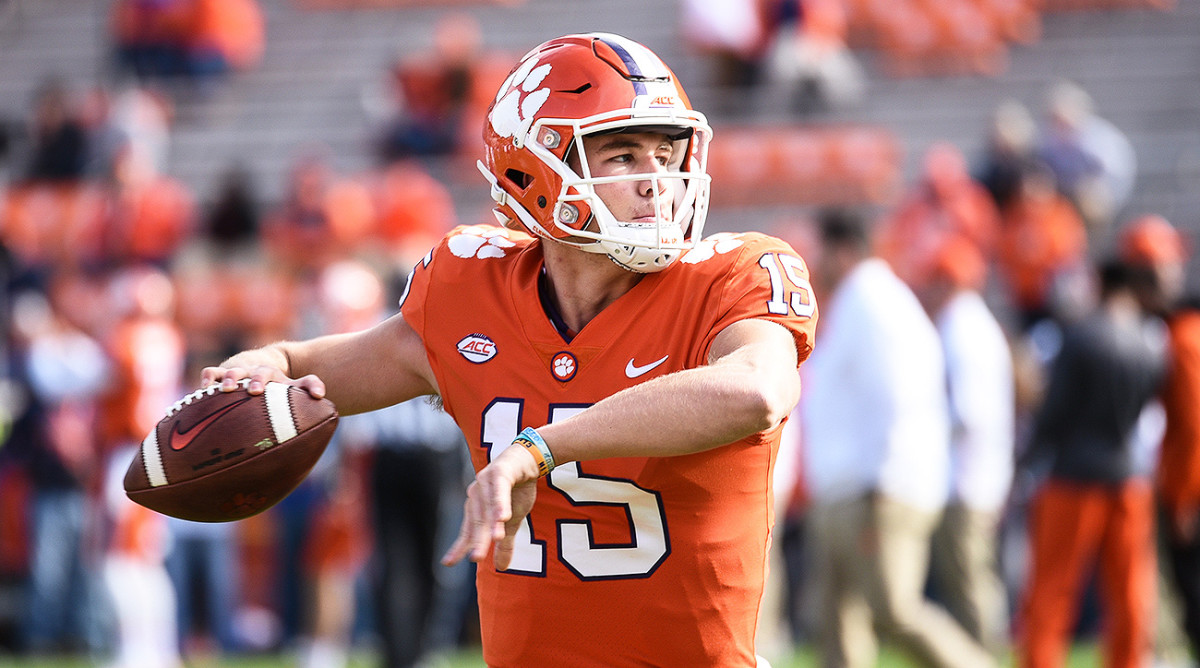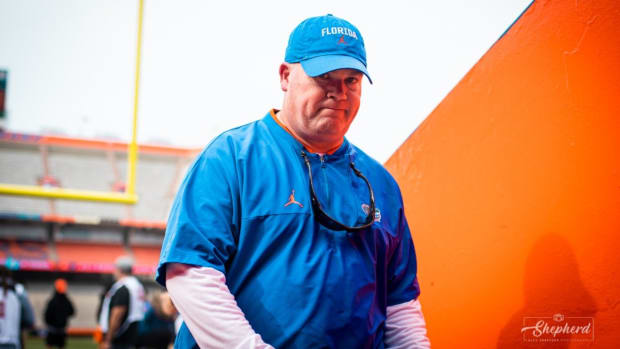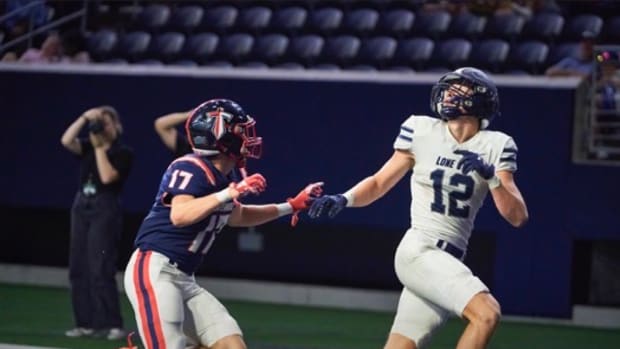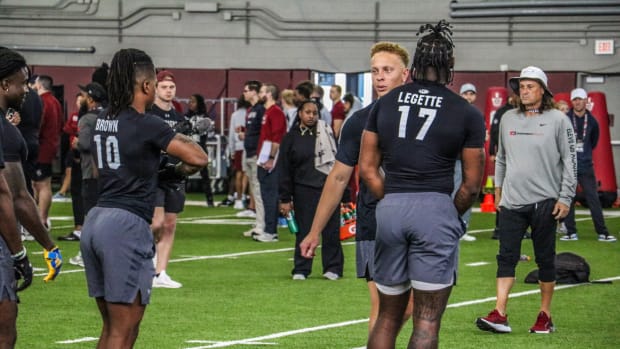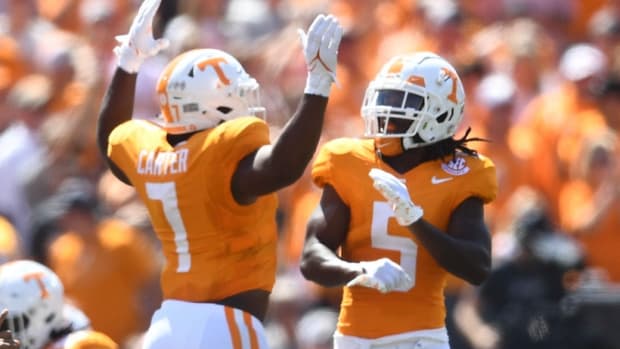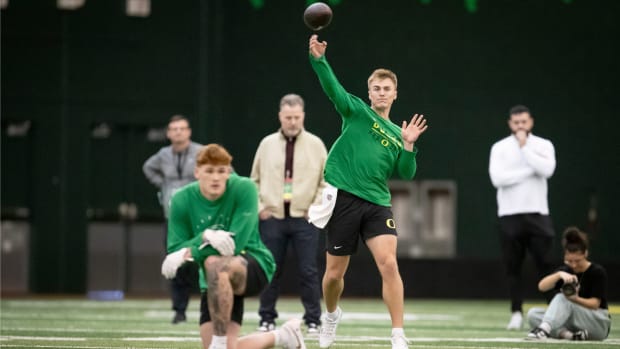Hunter Johnson's Transfer to Northwestern Adds New Dimension to Future of Big Ten West
The Big Ten West has belonged to Wisconsin during the College Football Playoff era. Since the advent of the sport’s long-awaited four-team postseason system in 2014, the Badgers have compiled a 45–10 record and reached the conference title game three times. Only once in the Big Ten’s current East-West configuration, in 2015, did the West send a different team (Iowa) to Lucas Oil Stadium the first Saturday of December to face the East champion for the league crown.
But Wisconsin’s stranglehold on the West could be loosening. Monday brought the latest news indicating the Badgers’ reign over one of the Power 5’s weakest divisions isn’t as stable as their recent on-field track record and early projections for 2018 suggest. Northwestern announced that it has received a verbal commitment from Clemson quarterback transfer Hunter Johnson. “My focus now is on doing everything in my power to help this team prepare to compete for a Big Ten West title,” Johnson, who’ll have three seasons of eligibility starting in the fall of 2019, said in a statement.
The No. 2 quarterback recruit in the class of 2017, according to the 247Sports Composite, Johnson enrolled early at Clemson last year as a promising potential successor to program legend and first-round NFL draft pick Deshaun Watson. During his true freshman season, Johnson failed to beat out veteran Kelly Bryant but acquitted himself well in limited reps as one of Bryant’s backups, completing 21 of his 27 passing attempts (77.8%) for 234 yards with two touchdowns against one interception.
Joe Moorhead’s Goal Isn’t Just to Win at Mississippi State. It’s to Win Championships.
That reserve work didn’t amount to much this spring. Bryant was back for his senior season after a promising junior campaign, but more importantly, Clemson had signed a quarterback recruit even more coveted than Johnson was coming out of Brownsburg High School in Indiana, after being named Most Valuable Player of the U.S. Army All-American Bowl. Cartersville (Ga.) High’s Trevor Lawrence clearly established himself as Bryant’s top competitor for the starting job by flashing the rocket arm, deft touch and NFL-ready frame that earned him the No. 1 spot in the 2018 247Sports Composite.
Johnson had already failed to beat out Bryant once, and now—because Clemson followed up signing a really talented QB (Johnson) with an even more talented one (Lawrence) the following year—Johnson was staring down the very real possibility of spending multiple seasons looking up at Lawrence on the Tigers’ quarterback depth chart. Instead, Johnson sought out a change of scenery with major upside for both the outgoing player and the program taking him in.
At Northwestern, where Johnson’s brother, Cole, was a walk-on wide receiver from 2013–16, Johnson will have a chance to lead a division contender while tapping into his potential as a potent, dual-threat playmaker. Before he’s able to suit up for the Wildcats next fall, Johnson can spend a season learning under fifth-year senior Clayton Thorson, a possible early-round pick in the 2019 draft working back from an ACL tear suffered in Northwestern’s Music City Bowl win over Kentucky.
Northwestern will need a stout defense, solid protection up front, reliable running game and playmakers around Johnson to challenge Wisconsin, but over his 12 seasons in charge in Evanston, Fitzgerald has never rolled out a signal caller as highly regarded as Johnson. An elite passer could distinguish the Wildcats from other West teams while elevating a passing attack that has failed to crack the top 60 in Bill Connelly’s S&P+ metric the last four seasons and last season ranked 93rd in efficiency and 97th in yards per attempt.
The Johnson commitment obviously is a big win for Northwestern, but its projected impact on the West’s competitive balance could be dwarfed by recent developments involving two other teams in the division.
First, Nebraska struck quickly on the coaching market, plucking Scott Frost from UCF about a week after a 42-point beatdown at the hands of Iowa ended both a dreadful 4–8 campaign and a floundering three-year tenure for Mike Riley. Although Frost has only two years of experience as a Division I coach, the former national championship-winning Huskers quarterback engineered a quick turnaround in Orlando, and his explosive offense should play well with recruits who have limited knowledge of the Cornhuskers’ pre-Big Ten glory days.
A few months later, Purdue signed second-year head coach Jeff Brohm to a contract extension through 2024 with a pay raise. Brohm, who was reported as a candidate for Tennessee’s head coaching vacancy last year before the Volunteers filled it with Alabama defensive coordinator Jeremy Pruitt, jolted the Boilermakers out of the dismal Darrell Hazell era with a 7–6 season powered by a breakneck offense that ended with a three-game winning streak, capped by a three-point triumph over Arizona and stud quarterback Khalil Tate in the Foster Farms Bowl.
Which Second-Year Coach Will Oversee the Biggest Improvement in 2018?
True, both coaching moves could fall short of expectations. Frost will need more time to get Nebraska in the playoff conversation than he did to turn UCF into a Group of Five power, and Brohm could well choose to leave West Lafayette for a more high-profile job this offseason. It’s also possible that Johnson simply isn’t as good as his recruiting ranking says he is, and that his transfer to Northwestern is less a commentary on Lawrence’s talent than Johnson’s own deficiencies.
There’s also no getting around the simple point that could shove these stories to the back burner in short order: Wisconsin does not appear to be slowing down any time soon. The Badgers bring back an experienced quarterback (junior Alex Hornibrook) and a Heisman Trophy threat at tailback (sophomore Jonathan Taylor) from a 13-win team coming off a double-digit victory over Miami in the Capital One Bowl, and their formula for success is eminently sustainable. Wisconsin keeps signing mostly three-star recruits, and it keeps developing them into hard-nosed veterans who buy into a winning culture.
Northwestern and other West teams may have taken meaningful steps forward this offseason, but it’s not clear they can close the gap between them and Wisconsin unless Wisconsin takes meaningful steps backward. Until further notice, the Badgers will stand alone on the division summit.
